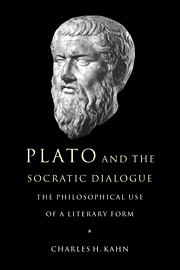Book contents
- Frontmatter
- Contents
- Preface
- List of abbreviations
- 1 Sōkratikoi logoi: the literary and intellectual background of Plato's work
- 2 The interpretation of Plato
- 3 Socrates
- 4 Plato as a minor Socratic: Ion and Hippias Minor
- 5 Gorgias: Plato's manifesto for philosophy
- 6 The priority of definition: from Laches to Meno
- 7 Charmides and the search for beneficial knowledge
- 8 Protagoras: virtue as knowledge
- 9 The object of love
- 10 The emergence of dialectic
- 11 The presentation of the Forms
- 12 Phaedrus and the limits of writing
- Appendix On Xenophon's use of Platonic texts
- Bibliography
- Indexes
Preface
Published online by Cambridge University Press: 02 November 2009
- Frontmatter
- Contents
- Preface
- List of abbreviations
- 1 Sōkratikoi logoi: the literary and intellectual background of Plato's work
- 2 The interpretation of Plato
- 3 Socrates
- 4 Plato as a minor Socratic: Ion and Hippias Minor
- 5 Gorgias: Plato's manifesto for philosophy
- 6 The priority of definition: from Laches to Meno
- 7 Charmides and the search for beneficial knowledge
- 8 Protagoras: virtue as knowledge
- 9 The object of love
- 10 The emergence of dialectic
- 11 The presentation of the Forms
- 12 Phaedrus and the limits of writing
- Appendix On Xenophon's use of Platonic texts
- Bibliography
- Indexes
Summary
I offer here an interpretation of Plato's early and middle dialogues which aims to do justice to the genius of Plato not only as a thinker but also as a writer. For Plato is the only major philosopher who is also a supreme literary artist. There is no writer more complex, and there is no other philosopher whose work calls for so many levels of interpretation. Plato was the first author to offer a systematic definition of the goals and methods of philosophy. But he was also a social reformer and an educator, whose conception of philosophy entailed a radical transformation of the moral and intellectual culture of his own time and place. Much of his writing is designed to serve this larger cause. Hence a perceptive interpretation of Plato's dialogues calls for attention to his revolutionary cultural enterprise as well as to the literary and philosophical dimensions of his work.
My understanding of Plato reflects three quite different traditions. As a student at the University of Chicago, I learned from David Grene to read Plato as a great dramatist who belongs in the company of Shakespeare and the Attic tragedians. As a doctoral student in Classics at Columbia University, I was initiated into the mysteries of historical philology by Ernst Kapp and Kurt von Fritz. There I came to see Plato's dialogues as central texts for Greek culture of the fourth century BG, in the perspective of the great Plato commentaries of John Burnet and E. R. Dodds.
- Type
- Chapter
- Information
- Plato and the Socratic DialogueThe Philosophical Use of a Literary Form, pp. xiii - xxPublisher: Cambridge University PressPrint publication year: 1997



